Overview
Essential features for e-commerce application development include:
- User profiles for personalization
- A robust shopping cart
- Secure payment systems
- Order tracking
- Effective customer support integration
These features are not merely beneficial; they are critical for enhancing user experience, driving sales, and fostering customer loyalty. By implementing these elements, businesses position themselves to thrive in a competitive online marketplace. It is imperative for companies to recognize the value of these features and act decisively to integrate them into their e-commerce strategies.
Introduction
The surge in global online retail, projected to reach an astonishing $7.4 trillion by 2025, highlights the pressing need for e-commerce applications that not only meet but exceed consumer expectations. As businesses endeavor to carve out their niche in this competitive landscape, grasping the essential features for e-commerce application development becomes crucial.
What functionalities can elevate an online store from ordinary to extraordinary? How can these be leveraged to enhance user experience and drive sales? This article explores the top ten features critical for e-commerce success, providing insights that empower businesses to thrive in an ever-evolving digital marketplace.
SDA: Custom Software Development for E-commerce Applications
SDA excels in e-commerce application development for online retail applications, delivering tailored solutions that significantly enhance user experiences and drive growth. By leveraging advanced technologies and a user-focused design approach, SDA ensures that e-commerce application development for online retail platforms is not only functional but also strategically aligned with overarching organizational objectives.
The global online retail market is projected to reach 7.4 trillion dollars by 2025, highlighting the critical demand for in e-commerce application development that adapt to evolving consumer expectations. SDA's expertise spans sectors such as healthcare and SaaS, enriching their offerings and establishing them as a preferred partner for businesses eager to innovate in the digital landscape.
Successful case studies, including the implementation of custom checkout systems that maintain a lower-than-average cart abandonment rate in the fashion online retail sector, demonstrate the tangible benefits of investing in e-commerce application development. Moreover, SDA recognizes the importance of offering multiple payment options in e-commerce application development to cater to diverse consumer preferences, thereby ensuring a seamless shopping experience.
As the demand for personalized shopping experiences escalates, SDA remains dedicated to e-commerce application development solutions that address the unique needs of each client, ensuring they remain competitive in a rapidly evolving market.
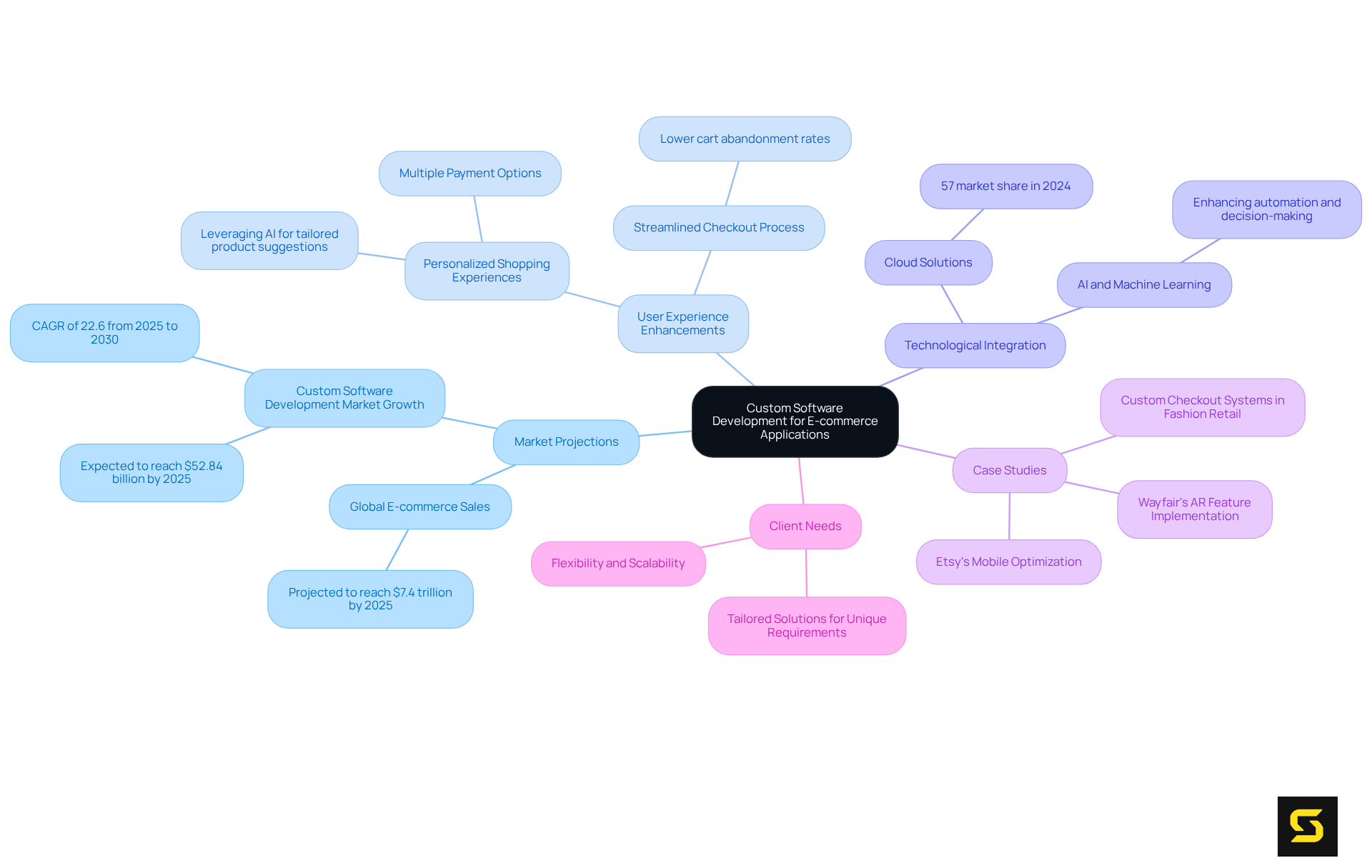
User Profile: Personalization and Convenience
User profiles are essential for e-commerce applications, enabling the delivery of by capturing client preferences, purchase history, and behavioral patterns. This wealth of data empowers businesses to tailor product recommendations, promotional offers, and content, thereby significantly enhancing user convenience. Notably, 91% of consumers prefer brands that remember their preferences for relevant offers, underscoring the critical role of personalization in building loyalty. Additionally, 65% of online retail stores have reported increased conversion rates following the implementation of personalization strategies.
By leveraging consumer profiles, online retailers not only foster stronger client relationships but also achieve higher conversion rates, positioning personalization as a crucial strategy for sustained growth. Furthermore, it is imperative for companies to manage data responsibly and comply with privacy regulations to maintain client trust while executing these strategies.
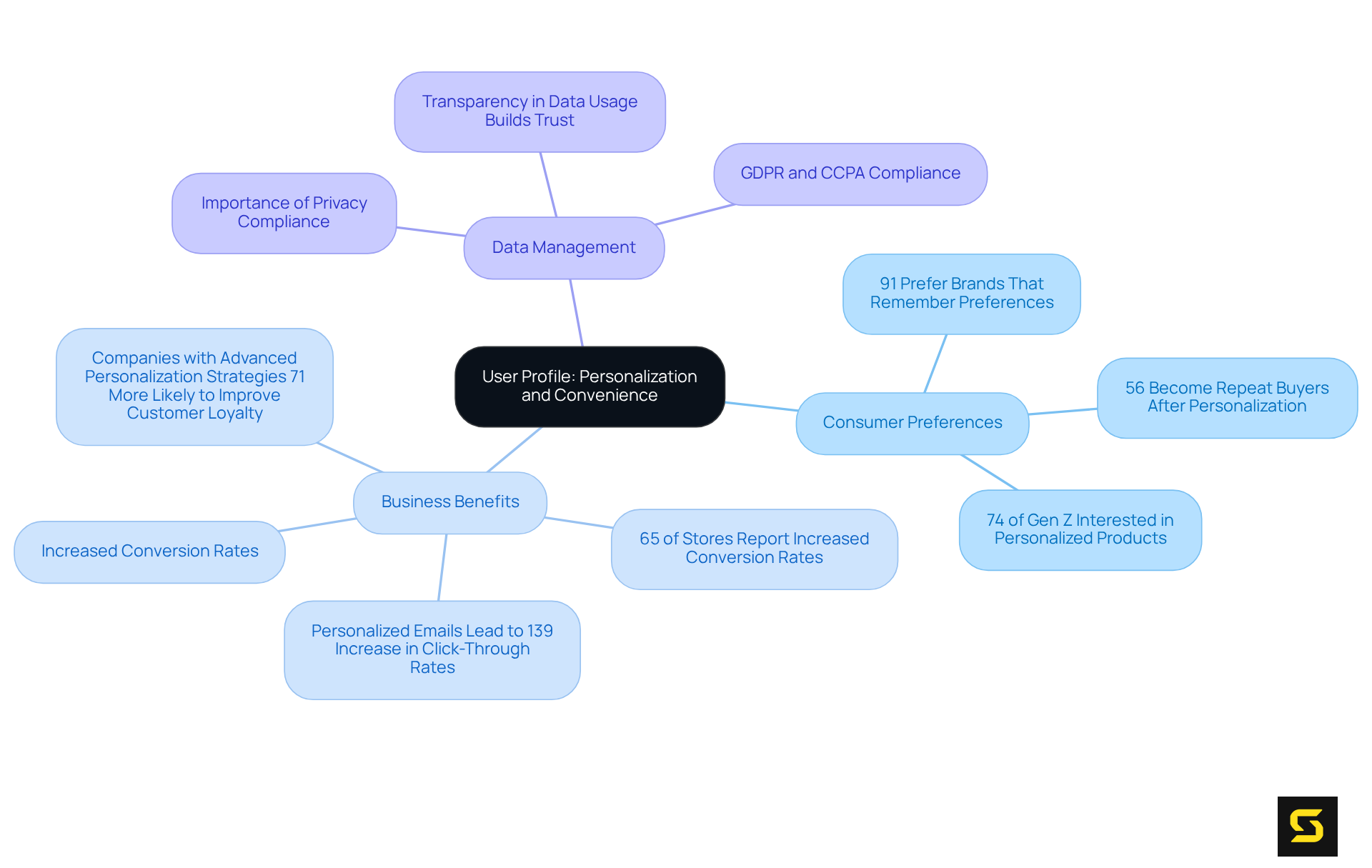
Shopping Cart: Essential for Managing Purchases
The shopping cart is a critical component of e-commerce application development, enabling customers to select, store, and manage items prior to completing their purchases. Key features include:
- The ability to modify quantities
- Apply discount codes
- View total costs
A well-crafted shopping cart not only simplifies the purchasing process but also encourages individuals to finalize their transactions, thus increasing sales and reducing cart abandonment rates. Notably, statistics indicate that the average cart abandonment rate stands at 70.19%, with mobile users facing the highest rates at 75.5%. Moreover, 48% of shoppers abandon their carts due to additional costs, such as shipping fees and taxes, underscoring the necessity for transparent pricing in cart design.
Successful e-commerce application development leverages advanced shopping cart features, including:
- Guest checkout options
- Clear visibility of total costs
These features create seamless experiences that . As we approach 2025, focusing on these essential features will be vital for online retail enterprises aiming to thrive in a competitive landscape.
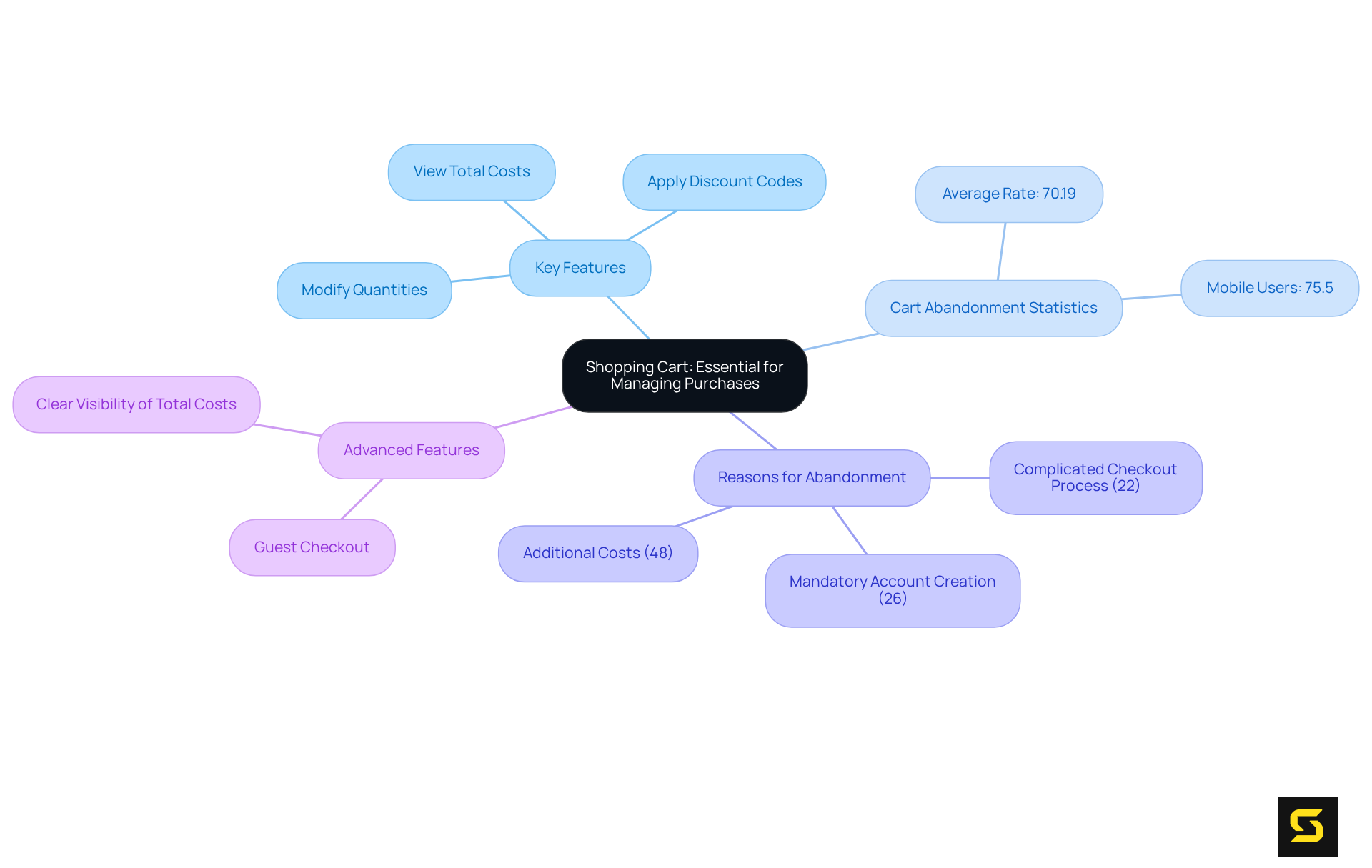
Payment System: Secure and Efficient Transactions
Incorporating a secure and efficient payment system is not just beneficial; it is essential for e-commerce application development. Offering multiple payment options—such as credit cards, digital wallets, and bank transfers—demonstrates a commitment to customer convenience while ensuring compliance with security standards like PCI DSS. A seamless payment experience significantly boosts customer trust and reduces friction during the checkout process, ultimately leading to increased conversion rates. Therefore, prioritizing a is a strategic move that can drive success in e-commerce application development within the competitive online marketplace.
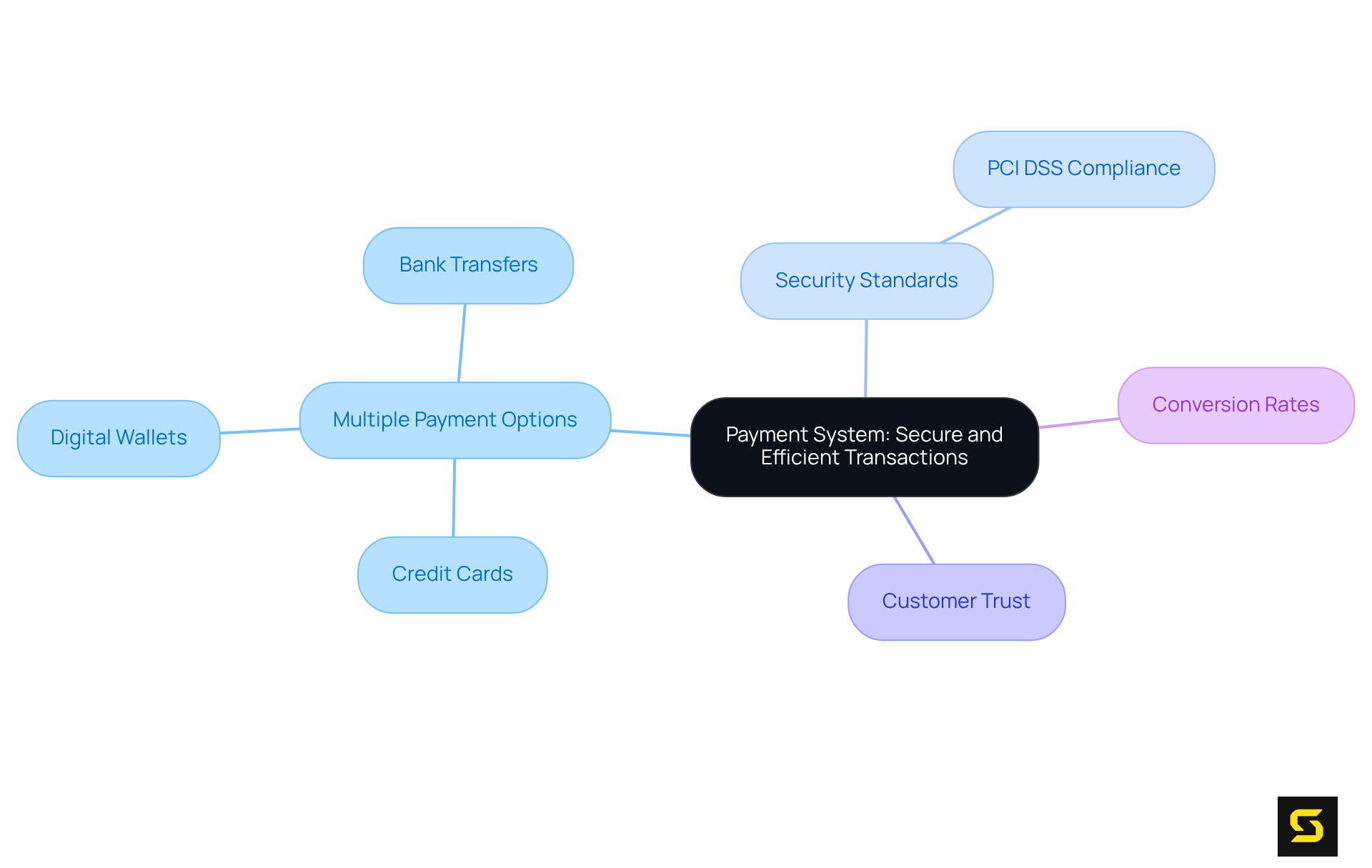
Order Tracking and Notifications: Enhancing Customer Transparency
Order tracking and notifications stand as pivotal components of e-commerce applications, enabling users to monitor their purchases from the moment of order placement to delivery. By providing real-time updates via email or SMS, businesses can significantly enhance transparency, alleviating the anxiety often associated with order fulfillment. This proactive communication not only fosters trust but also empowers clients, instilling a sense of control over their shopping experience.
Notably, research reveals that:
- 85 percent of consumers are inclined to repurchase from a company that offers comprehensive order tracking from start to finish.
- Timely notifications can drastically reduce the volume of 'Where is my order?' inquiries, thereby alleviating pressure on support teams.
As Ginesys aptly states, "In this era of instant gratification, vague delivery windows, and opaque status updates just don't cut it."
Ultimately, are essential for bolstering client satisfaction and loyalty in the fiercely competitive landscape of e-commerce application development. Additionally, a striking 86 percent of consumers assert that transparency significantly influences their buying decisions, underscoring the vital role of clear communication in cultivating customer loyalty.
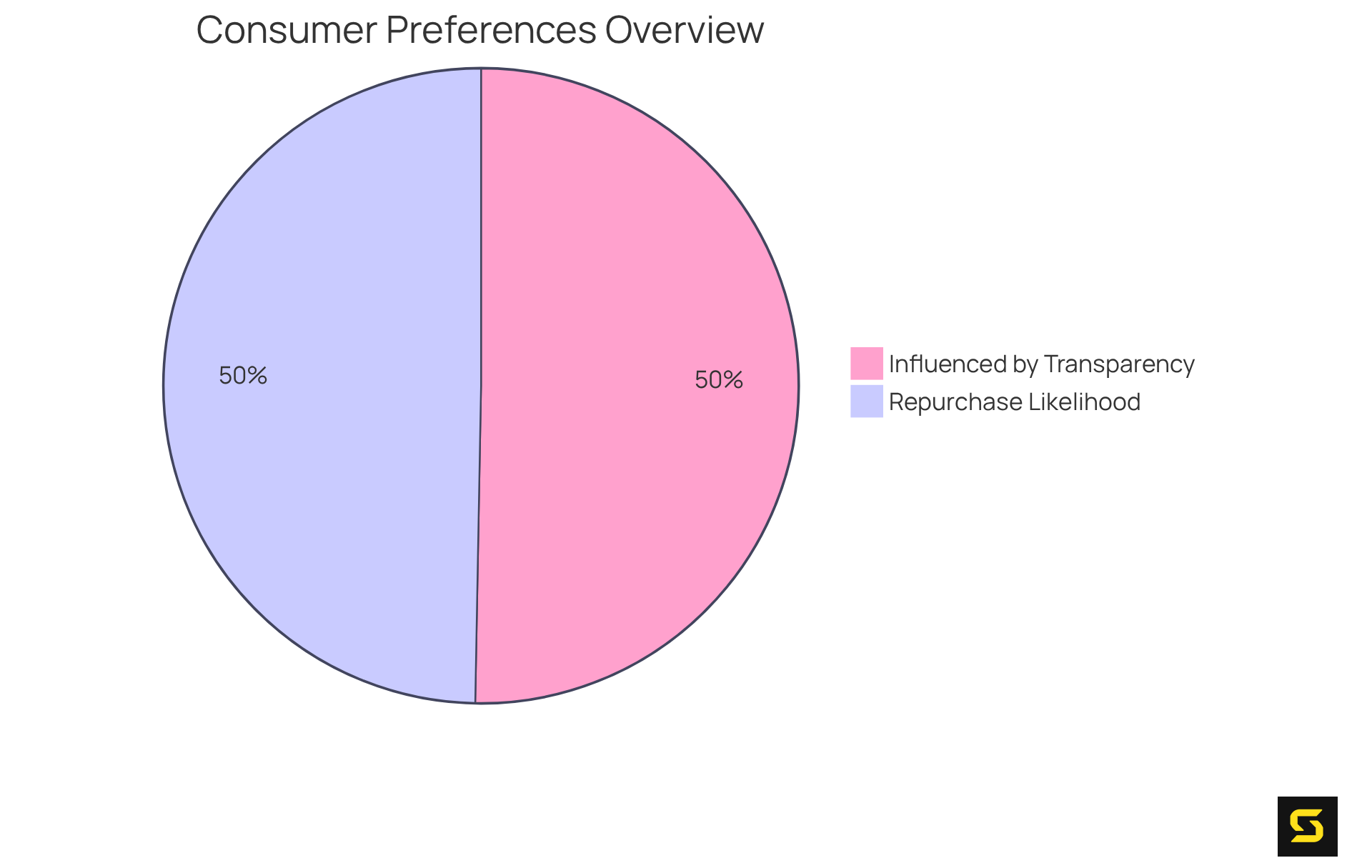
Search and Filters: Streamlining Product Discovery
Implementing robust is essential for e-commerce applications, as it significantly enhances product discovery. Features such as:
- Keyword search
- Category filters
- Sorting options
empower users to efficiently narrow down their selections based on specific criteria, including:
- Price
- Size
- Color
By optimizing the search process within e-commerce application development, companies not only improve customer satisfaction but also drive higher conversion rates, reinforcing the necessity of these features in today’s competitive market.
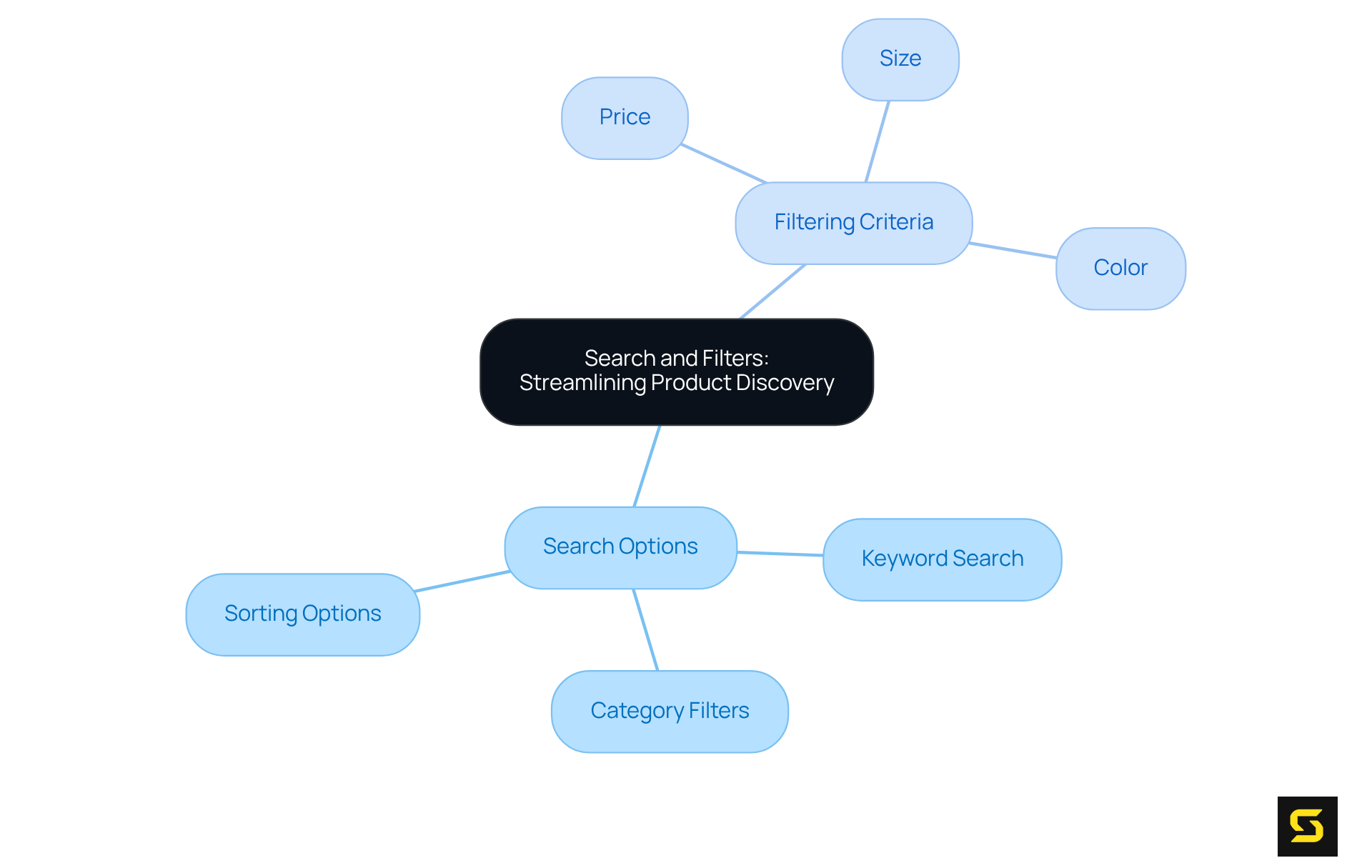
Customer Support Integration: Ensuring User Satisfaction
Incorporating support features such as live chat, FAQs, and ticketing systems into e-commerce application development is essential for enhancing user satisfaction. Live chat provides prompt support, allowing businesses to respond to inquiries in real-time, significantly improving the overall shopping experience. This proactive approach not only resolves issues swiftly but also fosters and trust.
Notably, statistics indicate that:
- Shoppers who engage with live chat spend 60% more on their purchases, demonstrating its effectiveness in driving sales.
- 77% of online shoppers report that they will abandon a purchase if live chat support is unavailable, emphasizing its critical role in e-commerce application development.
- 84% of shoppers consider service quality a vital factor in their buying decisions, underscoring the necessity for efficient support tools.
By implementing live chat, businesses can cultivate a more interactive and engaging environment, ultimately leading to enhanced client satisfaction and retention. Moreover, organizations that leverage live chat can gain a competitive advantage over those relying on traditional service methods.
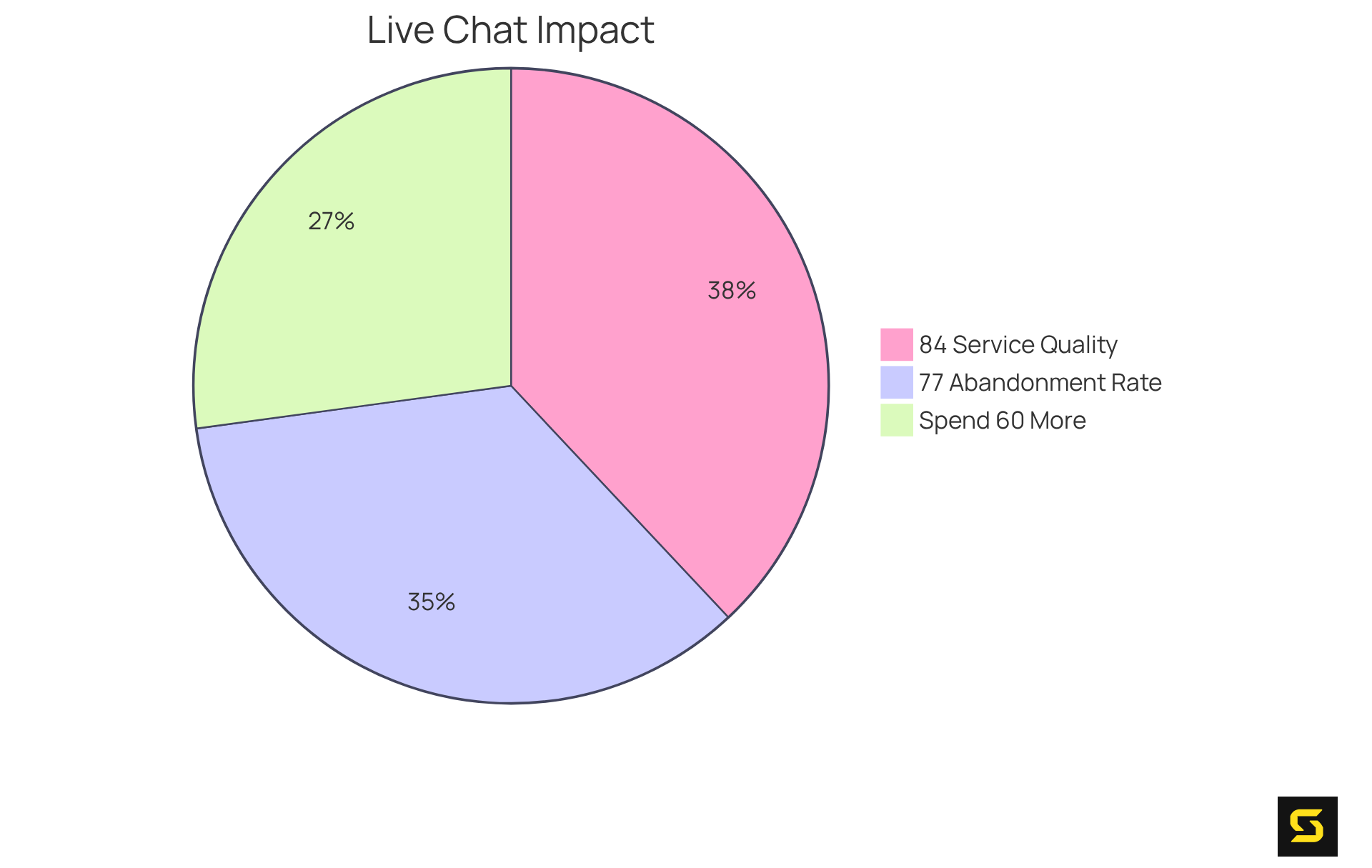
User Reviews and Ratings: Building Trust and Credibility
Integrating user reviews and ratings into e-commerce applications is essential for establishing trust and credibility. Today's shoppers increasingly depend on the experiences of others when making purchasing decisions; in fact, 65% of individuals often or always before buying, according to the 2024 Product Content Benchmark.
Positive feedback not only enhances a brand's reputation but also significantly influences consumer choices, leading to an impressive 108.3% increase in conversion rates when shoppers engage with product ratings and reviews. This effect is particularly pronounced for higher-priced products, which can experience conversion rates soaring by as much as 380%.
By prominently showcasing authentic client feedback, companies can foster increased trust among prospective purchasers in their e-commerce application development, motivating them to engage with products. Moreover, displaying both positive and negative reviews is vital for setting realistic expectations and enhancing credibility, as consumers prefer to see a balanced view of feedback to make informed decisions.
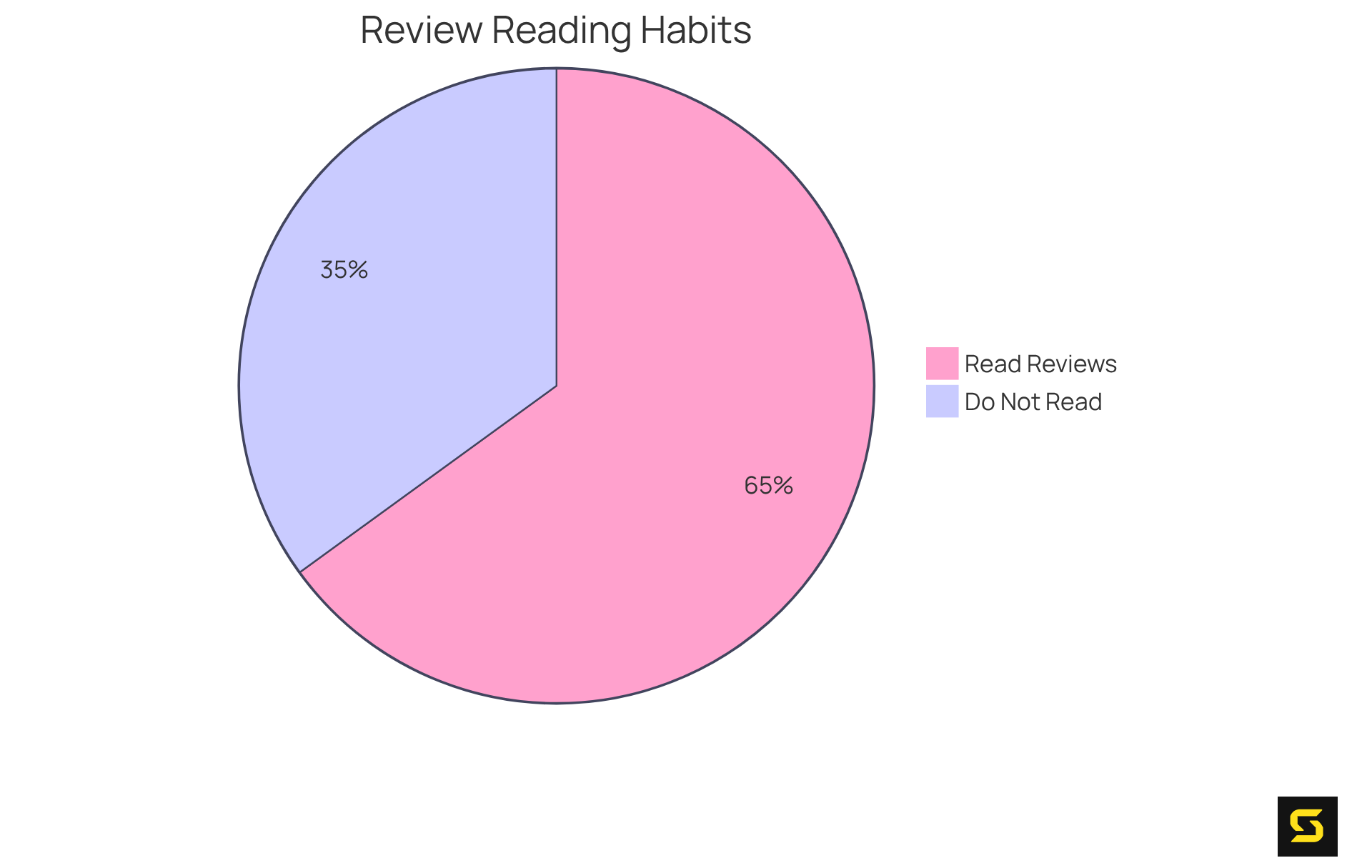
Push Notifications: Boosting User Engagement
Push notifications serve as a vital instrument for enhancing engagement within e-commerce application development. By delivering timely alerts about promotions, new product launches, and order updates, businesses effectively keep customers informed and motivated to revisit the app.
Personalization is key in this process; notifications tailored to individual behaviors and preferences significantly boost their effectiveness. Research indicates that individuals receiving notifications in their first 90 days exhibit than those who do not.
Furthermore, incorporating rich media and concise messaging can elevate interaction; push notifications comprising 10 or fewer words achieve nearly double the click rate compared to those with 11-20 words, and nearly triple the click rate of notifications exceeding 20 words. Notably, 48% of users have made a purchase following a push notification.
By implementing these strategies, online retail businesses can foster client loyalty and drive sales, solidifying push notifications as an indispensable component of their marketing toolkit.
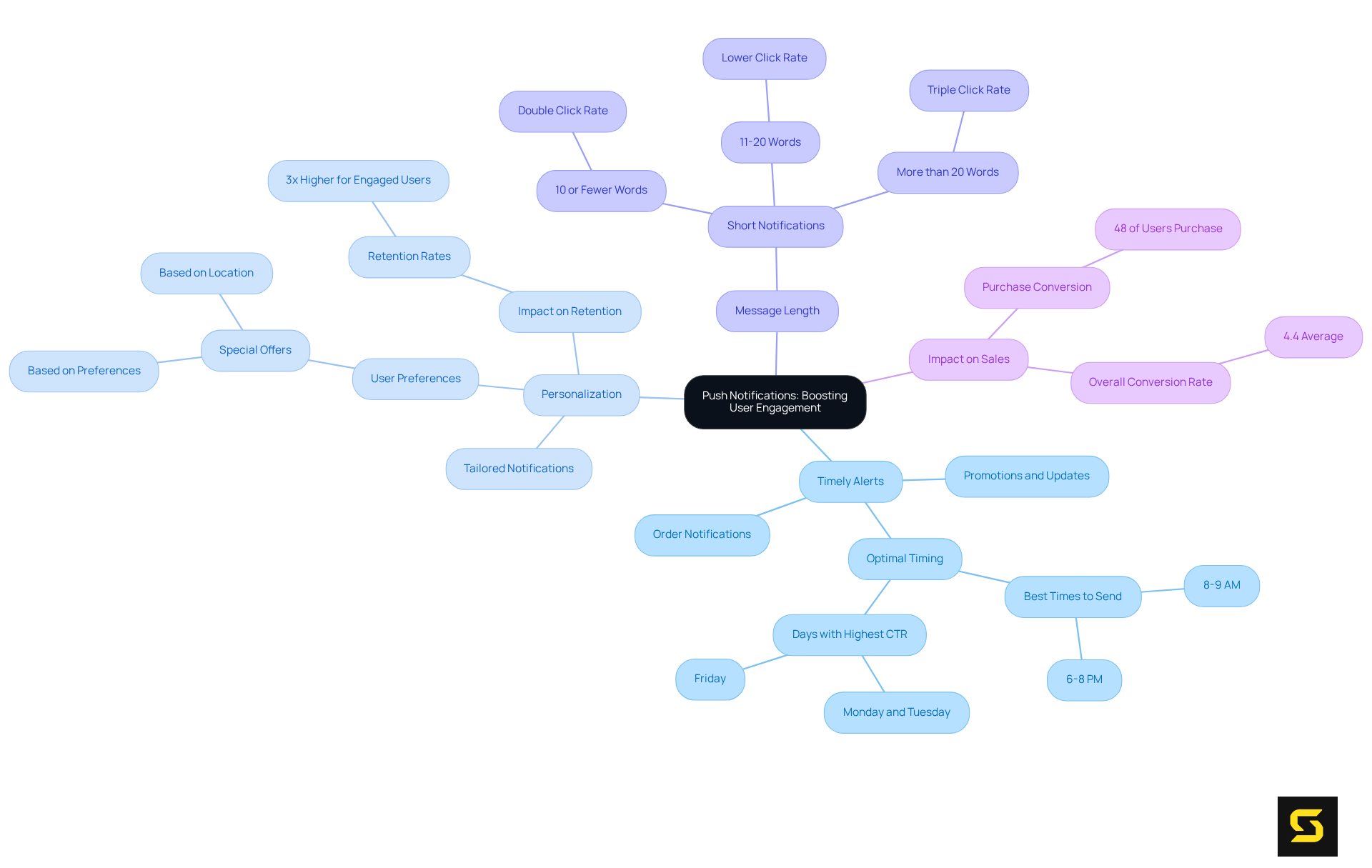
Data Security: Protecting Customer Information
Data security is paramount for e-commerce application development, as it safeguards client information from unauthorized access and potential breaches. Given that the e-commerce application development industry accounts for 32% of all cyberattacks globally, the necessity for robust security measures cannot be overstated.
Implementing SSL encryption is essential, as it secures data transmitted between the server and users' browsers, fostering trust through safe connections. Furthermore, utilizing secure payment gateways equipped with advanced encryption and fraud detection technologies is crucial for safeguarding sensitive financial information.
Regular security audits play a vital role in identifying vulnerabilities and ensuring compliance with industry standards. As noted, "Regular security evaluations, clear protocols, and consistent monitoring establish a safeguarded environment for client data." Additionally, employee training on data protection practices is critical, as human factors significantly influence overall security.
By prioritizing these security measures, businesses not only protect their customers but also enhance their reputation in the competitive online marketplace, which is essential for e-commerce application development, ultimately fostering customer loyalty and driving sales.
The recent serves as a cautionary example of the vulnerabilities present in the e-commerce ecosystem, underscoring the importance of these security measures.
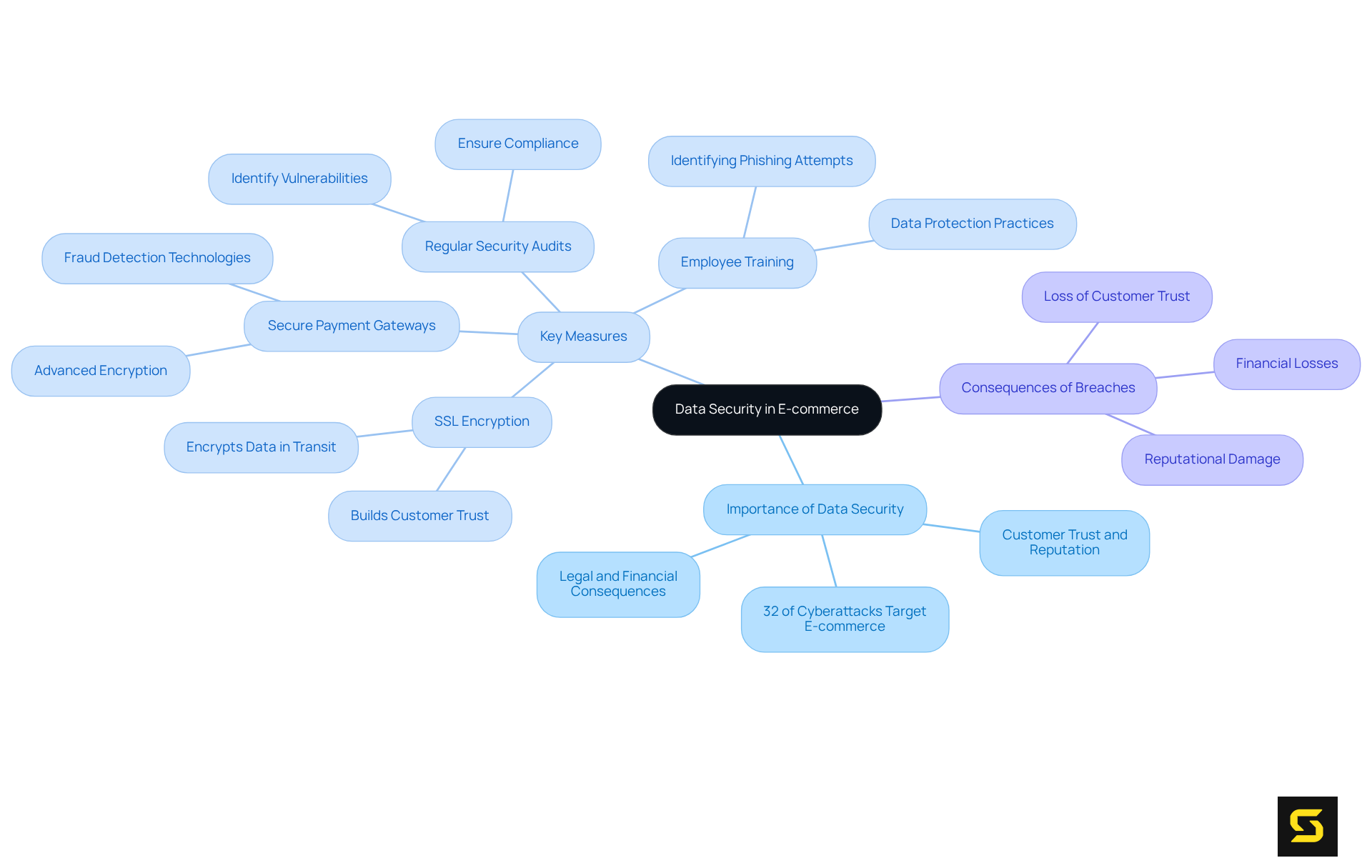
Conclusion
The landscape of e-commerce application development is continuously evolving, making the incorporation of essential features more critical than ever. By focusing on user experience, personalization, and robust security measures, businesses can create applications that not only meet but exceed consumer expectations. Effective shopping carts and secure payment systems are vital components that enhance the overall shopping journey and drive customer loyalty.
Key insights from the article underscore the necessity of integrating user profiles for personalization, implementing efficient order tracking, and ensuring seamless customer support. These features not only improve user satisfaction but also significantly boost conversion rates and retention. Furthermore, the emphasis on data security is paramount; protecting customer information is essential for establishing trust and credibility in the competitive online marketplace.
In conclusion, embracing these must-have features for e-commerce applications is vital for businesses aiming to thrive in a rapidly changing digital environment. By prioritizing user-centric design and innovative solutions, organizations can position themselves for success, ultimately fostering a loyal customer base and driving sustainable growth. As the e-commerce landscape continues to expand, investing in these functionalities will not only enhance the user experience but also solidify a brand's presence in the market.
Frequently Asked Questions
What does SDA specialize in regarding e-commerce applications?
SDA specializes in custom software development for e-commerce applications, delivering tailored solutions that enhance user experiences and drive growth for online retail platforms.
What is the projected growth of the global online retail market?
The global online retail market is projected to reach 7.4 trillion dollars by 2025, indicating a critical demand for innovative software solutions in e-commerce.
How does SDA ensure its e-commerce applications meet organizational objectives?
SDA ensures that e-commerce application development is functional and strategically aligned with overarching organizational objectives by leveraging advanced technologies and a user-focused design approach.
What benefits have been observed from SDA's e-commerce application development?
Successful case studies, such as custom checkout systems, have shown a lower-than-average cart abandonment rate in the fashion online retail sector, demonstrating tangible benefits from investing in e-commerce development.
Why is personalization important in e-commerce applications?
Personalization is crucial as it enhances user convenience, builds loyalty, and has been linked to higher conversion rates, with 91% of consumers preferring brands that remember their preferences.
What role do user profiles play in e-commerce applications?
User profiles capture client preferences, purchase history, and behavioral patterns, allowing businesses to tailor product recommendations and promotional offers to enhance user experiences.
What are the key features of a shopping cart in e-commerce applications?
Key features of a shopping cart include the ability to modify quantities, apply discount codes, and view total costs, which simplify the purchasing process and encourage transaction completion.
What is the average cart abandonment rate, and what contributes to it?
The average cart abandonment rate is 70.19%, with mobile users experiencing higher rates at 75.5%. Common reasons for abandonment include additional costs such as shipping fees and taxes.
What advanced features should e-commerce shopping carts include to improve sales?
Advanced shopping cart features should include guest checkout options and clear visibility of total costs, which create seamless experiences that enhance sales and customer satisfaction.
Why is it important for e-commerce companies to manage data responsibly?
It is imperative for companies to manage data responsibly and comply with privacy regulations to maintain client trust while executing personalization strategies.





